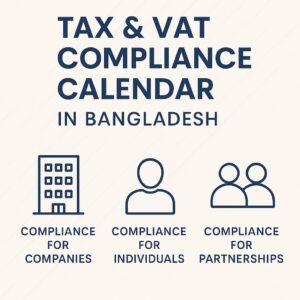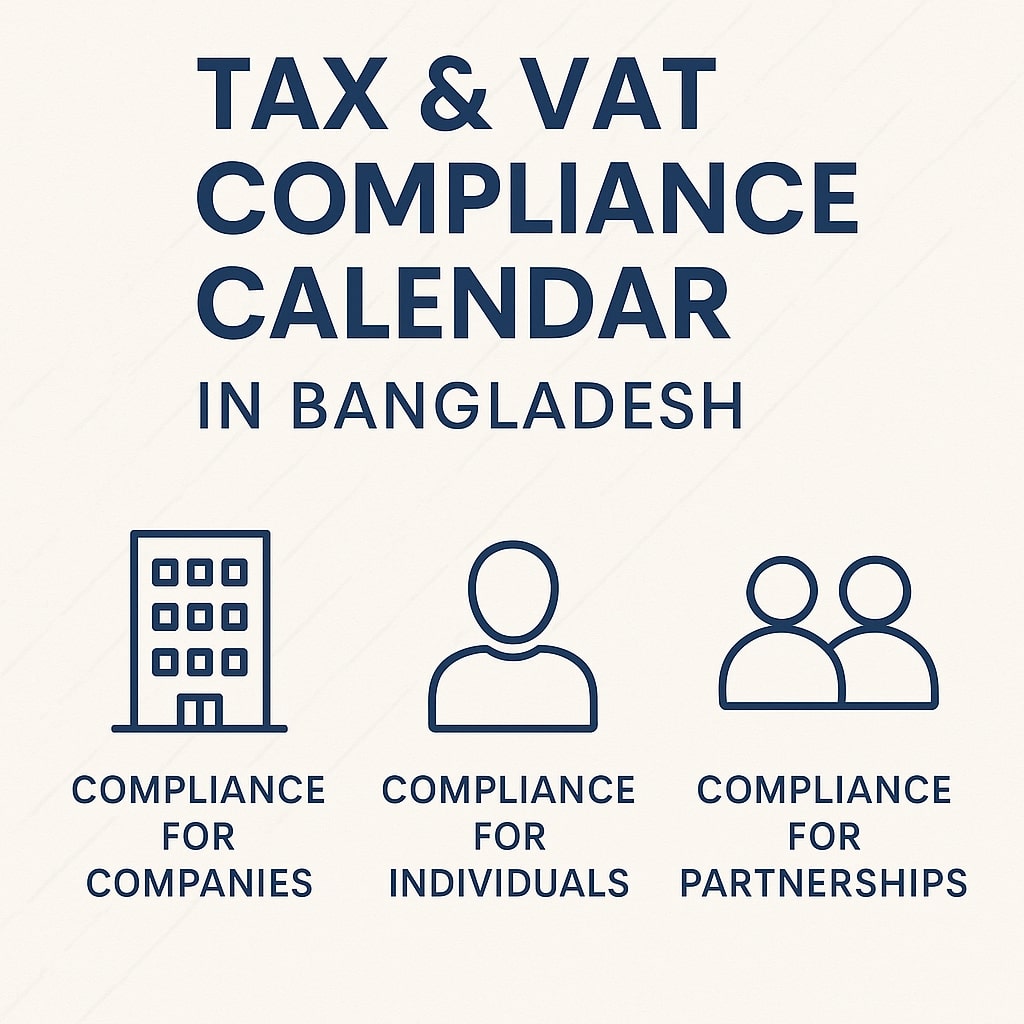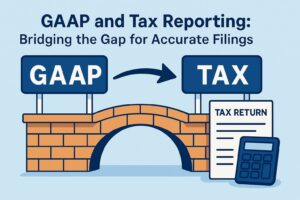Tax & VAT Compliance Calendar in Bangladesh (Individual, Partnership & Company)
Introduction
Taxation plays a crucial role in shaping the financial architecture of any nation, and Bangladesh is no exception. Governed primarily by the Income Tax Act 2023 and the Value Added Tax (VAT) and Supplementary Duty Act 2012, tax and VAT compliance are mandatory for all entities—individuals, partnership firms, and companies. Each category of taxpayer has unique obligations, filing deadlines, and procedural nuances that must be followed diligently to avoid fines, penalties, or legal action.

Understanding the tax calendar and the respective compliance checkpoints can greatly help businesses and individuals plan ahead, reduce risks, and improve financial transparency. This guide presents a comprehensive calendar and compliance breakdown across three main taxpayer categories: companies (corporate entities), individuals, and partnership organizations.
1. Compliance for Companies (Corporate Entities)
In Bangladesh, companies registered under the Companies Act are recognized as separate legal entities. As such, they are liable for a wide range of tax and VAT obligations.
Income Tax Compliance
1.1 Corporate Tax Return Filing
All companies must submit their annual income tax return by January 15 of the following financial year (ending on June 30). This return must include audited financial statements, a tax computation sheet, and supporting documents including balance sheets, profit and loss accounts, and schedules.
1.2 Tax Deducted at Source (TDS)
Companies are responsible for deducting tax at source on various types of payments such as salaries, rent, professional services, interest, contractor payments, and more. The deducted TDS must be deposited to the government by the 25th of the following month and the relevant TDS return must also be submitted accordingly.
Particulars of yearly salary tax deduction to submit in the month of September and particulars of income tax return submission yearly in the month of April.
1.3 Advance Tax Payments
Companies with projected tax liabilities above a threshold must make quarterly advance tax payments. The due dates are:
March 15, June 15, September 15, December 15
Failure to pay advance tax may lead to interest charges under Section 74 of the Income Tax Act 2023.
VAT Compliance
1.4 Monthly VAT Return Filing
Corporate entities registered under the VAT Act must file monthly VAT returns (Form Mushak-9.1) by the 15th of the following month. Returns should include purchase and sales details, input-output tax calculation, and relevant vouchers.
Submission of VAT Value Declaration. VAT4.3, VDS Certificate VAT6.6 Purchase over 2 lac VAT 6.10 and VAT Return VAT 19
1.5 VAT Payment Deadline
VAT liability must be settled within 15 days after the end of the tax period (monthly). Delay in payment incurs penalties and interest.
1.6 Annual VAT Audit & Compliance Report
Companies may be subject to an annual VAT audit. If selected, a comprehensive audit and compliance report must be submitted by June 30.
1.7 Supplementary Duty (SD) Filing
Companies engaged in manufacturing or importing goods listed under the SD Schedule must file a monthly SD return along with VAT. These filings are due by the 15th of the following month.
Key Considerations for Companies
Digital Filing: NBR encourages companies to use the e-filing system for returns and payments.
Record-Keeping: Maintain meticulous records of transactions, invoices (Mushak-6.3), and financial reports.
Penalties for Noncompliance: Fines, interest, and business suspension may be enforced for failure to comply with tax laws.
Audit Readiness: Be prepared for tax audits by maintaining up-to-date documentation.
2. Compliance for Individuals
Individuals—whether salaried professionals, business owners, or freelancers—must also comply with tax regulations. The extent of their obligations varies depending on income level, nature of income, and whether they are VAT-registered.
Income Tax Compliance
2.1 Annual Tax Return Filing
Every individual earning above the taxable threshold must submit an income tax return using Form IT-11GA by November 30 each year. The return must include:
Total income from all sources
Investment tax credit details
Wealth statement (if applicable)
2.2 Advance Tax Payments (If Applicable)
Individuals with business income or rental income may be required to pay advance tax on a quarterly basis, following the same deadlines applicable to companies.
2.3 Tax Deducted at Source (TDS)
For individuals who employ staff or professionals (e.g., consultants), TDS must be deducted and deposited monthly. Additionally, salaried individuals may have TDS deducted by their employer and submitted to the government.
VAT Compliance
2.4 VAT Payment & Return Filing
Self-employed individuals and proprietors running VAT-registered businesses must:
File VAT returns by the 15th of the following month
Pay VAT liabilities within the stipulated time
Maintain Mushak documents such as invoices, purchase book, and sales book
2.5 VAT Registration
Individuals running businesses exceeding the turnover a certain threshold are required to register for VAT. This includes freelancers earning through digital platforms or offering online services.
2.6 Supplementary Duty (SD)
SD applies to individuals dealing in luxury goods or services such as cigarettes, soft drinks, or telecom services. Monthly SD returns are due by the 15th of the next month.
Key Considerations for Individuals
Tax Credit Benefits: Investments in government bonds, savings certificates, retirement funds, and insurance policies may reduce taxable income.
Use of TIN (Taxpayer Identification Number): Individuals must obtain and renew their TIN annually to avoid transaction restrictions (e.g., opening a bank account, buying property).
Audit Exposure: High-income individuals or irregular filers may be selected for audits.
Surcharge: Individuals with wealth exceeding BDT 4 crore are subject to a wealth surcharge.
3. Compliance for Partnership Organizations
Partnership firms, while not distinct legal entities like companies, are still required to meet specific tax and VAT obligations. The firm itself files returns, and each partner must report their share of income.
Income Tax Compliance
3.1 Partnership Tax Return Filing
Partnerships must file their income tax return by January 15 of the assessment year using Form IT-11B. Returns should include:
Income statement of the firm
Allocation of profits to partners
Supporting documents such as purchase/sale registers
3.2 TDS Submission
If a partnership firm pays salaries, rent, or contractor fees, TDS must be deducted and submitted monthly by the 25th of the following month, similar to company obligations.
3.3 Advance Tax Payments
If the partnership firm has substantial profits, it must pay advance tax quarterly. The partners may also have to make advance payments based on their individual liability.
VAT Compliance
3.4 Monthly VAT Return Filing
Firms with VAT registration must file monthly VAT returns by the 15th of each month, disclosing VAT collected and paid on purchases and sales.
3.5 VAT Registration Renewal
All VAT-registered partnership entities must renew registration annually before December 31 to remain compliant.
3.6 Supplementary Duty (SD) Compliance
Partnerships that sell products or services subject to SD must submit monthly SD filings along with VAT returns.
Key Considerations for Partnership Organizations
Profit Sharing and Tax Liability: The firm is taxed on total income, but partners are taxed individually on their allocated profits.
Documentation: Accurate documentation of partner contributions, profit distributions, and expenses is critical.
Dispute Avoidance: Proper tax filing and transparent financial records help avoid internal disputes and external legal issues.
Audit Risk: High-revenue firms are more likely to be audited, requiring thorough preparedness.
Compliance Calendar Summary
Compliance Type
Entity
Deadline/Frequency
Income Tax Return
Company
January 15 annually
Income Tax Return
Partnership
January 15 annually
Income Tax Return
Individual
November 30 annually
TDS Return Filing
All entities
25th of following month
Advance Tax
All applicable taxpayers
Quarterly (Mar 15, Jun 15, Sep 15, Dec 15)
Monthly VAT Return
All VAT-registered entities
15th of following month
VAT Payment
All VAT-registered entities
15th of following month
SD Return Filing
Entities selling SD-liable goods
Monthly (15th)
VAT Registration Renewal
Partnerships and Individuals
December 31 annually
Annual VAT Compliance Report
Companies
June 30
Conclusion
Tax and VAT compliance in Bangladesh is a structured yet complex process, with varying obligations for individuals, partnerships, and companies. Whether you’re a corporate executive, a small business owner, or a freelancer, understanding the tax calendar and aligning your financial practices accordingly is essential to remain on the right side of the law.
Maintaining accurate records, submitting returns on time, paying taxes diligently, and staying updated on regulatory changes are the pillars of sound compliance. Leveraging digital tools like the NBR e-filing portal, engaging qualified tax professionals, and regularly reviewing internal controls can significantly ease the tax burden and improve compliance efficiency.
Non-compliance is not just a financial risk—it can damage reputation, invite audits, and disrupt operations. Being proactive, informed, and disciplined about tax obligations ensures not only legal compliance but also long-term financial health.




